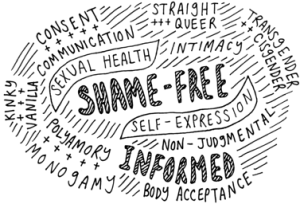In November 2014 a group of sex positive minded people founded Sex Positive Belgium, a chapter of the mother organisation Sex-Positive World, and gathered for an opening weekend full of workshops, entertainment, party and discussion in a cosy familial get-together-style.
Those first core members were gradually joined by others and worked together to build a thriving community where people could come together who share a like minded vision of a world where sexuality in the broadest sense of the word could be experienced and explored without fear of judgement and fueled with understanding, science, empathy, and trust.
What is Sex-Positivity Anyway?
Sex-Positivity is more of an attitude towards people, culture and society to accept people as they are and how they feel. People are diverse, and this shows in our sexual identity. Our sexual identity gets built up throughout our life, from the moment we are in the womb (binary boy/girl, expectations, names) to the moment people deal with our deceased body (different rites). A lot of this is defined by the culture we live in: our ideas about gender and biological sex, our role in society, the importance of sexual contact and how that should be done to be ‘good’ or ‘healthy’, the importance of intimate relationship forming, what a ‘good’ or ‘sustainable’ relationship is and what that means.
Sex-Positivity does not follow these cultural guidelines and steps away from any moral judgement regarding these choices, feelings and desires, while acknowledging people’s autonomy and authority over one’s self as the only authority that can say something meaningful about one’s self.
Next to this it also entails a component of placing our cultural selves in a cultural world. If you grow up in a world where orange juice is seen as the best drink to have, you will get a lot of people who identify with that thought. The important part is to realise that even though this desire can be felt as real, it can still come from a cultural construction. Which again, does not mean it is bad or good, but is important to realise that on a cultural level, these can be carried by a historical cultural development driven by powers of a (previous) cultural ideology.
This way you get the construction of ‘norms’, meaning the majority follows and/or identifies with this, and can often be very subtle, in cases where they got passed on over hundreds of generations. Gender power dynamics are an example of this. Sex-Positivity invites us to acknowledge these, and take them into account. This is called critical analysis and sex-positivity can not go without it.
Sex-Positivity is: 
- A way to acknowledge that human sexuality is diverse and broad. There is no one definition of “normal.”
- Non-judgmental, or in any case it asks us to be aware of (and be in control of) our own judgements.
- Opposed to shaming others about sexual (and gendered) matters, including children.
- A way to acknowledge that we should have certain sexual rights, including the right to comprehensive, appropriate, pleasure-inclusive, positive sex education.
- A construct that invites us to acknowledge that pretty much any fully consensual behaviour might be right for someone, and pretty much nothing is right for everyone.
- An idea that cannot be fully expressed outside of an atmosphere/context of consent. Informed, non-coercive consent. CONSENT.
- A term that can include anyone, including virgins, asexuals, people who have been abused, people who have never had pleasurable or even good sex–because it does not describe the sex they do or do not have, it describes their attitude about sexual diversity and people’s sexual rights. (And of course it may be a tool to open the door to much more positive sex – but only if it is what they want and desire.)
- More than anything, a way to critique our current culture – which clearly is not sex-positive. I express the critique like this: What would it take for our culture to be fully sex-positive? What are the elements that would get us there? (I invite you to think about that question – it is a valuable lens in a personal context and in activist work.)
- A notion that gives us access to true respect for other people’s sexualities.
Sex-Positivity is NOT:
- A phrase that means “I love sex!” (Though if you do – that’s great! Yay, you!)
- A phrase that means “I’m kinky or experimental; I’m not vanilla.” (Vanilla people can be just as sex-positive as kinksters, and in fact, not all kinksters are sex-positive!)
- A phrase that can EVER be used this way: “If you were really sex-positive, you would have sex with me/do that kinky thing I want to try/open our relationship/etc.”
- To be used as a source of judgement or shaming of other people – including heterosexuals, asexuals, non-kinky folk, celibate people, or anybody else.
- A way to judge others for not enjoying sex enough.
- A new norm about what people should do in their sex lives.
- A license to assume that your sexual response, experience, desires, and feelings are or should be shared by everybody else.
 What is the Goal of Sex-Positive Belgium?
What is the Goal of Sex-Positive Belgium?
The aim is to present a platform where people can find the values of sex-positivity presented and expressed and further develop their knowledge and experience in a practical way, together with other people.
Education and Personal Development
- To offer a platform that presents workshops, discussions, lectures and social events where people can find opportunities to explore, grow, challenge, experiment and develop on a personal level. Some of these will be structured with a provided safer space and/or provided care-facilitation depending on the nature of the event, while others can be presented by the community members themselves as long as they identify with our core values and given the notice that these might not follow our guidelines for events (safer space/level system/care facilitation).
- Furthermore we encourage critical reflection on personal choices in order to be more conscious of cultural influence.
- Lastly, to bring a diversity of people together to learn from each other’s unique perspective in life, each with their own socialisation, desires and struggles.
Community
To bring people together who share this sex-positive attitude in order to consensually talk freely, express freely, learn from each other, inspire each other, socialise, and connect with each other and where their desires and boundaries get acknowledged and not shamed or judged.
Activism
To spread the practice and idea of sex-positivity beyond the group, in a peaceful way, with the goal to influence society, culture and its people in order to make our group eventually unnecessary.
Core Values
Respect and Communication
It is important that people within the community respect each other by addressing any grievance or constructive feedback privately, rather than through a public forum. If a resolution cannot be reached with the individuals, please contact the Membership Coordinator, the Regulatory Committee, or the caretaker if at an event.
Acknowledging the Other as Valid
People come from all walks of life, and that comes with its own unique perspective and awareness of feelings. Please acknowledge that these might be different from yours and everybody has their own truth which you might not be able to fully understand. This will be represented in all following core values as well.
Cultural Inclusivity
Recognising that privilege and access have heavily influenced the prominence of primarily white, cisgender, heterosexual, Judeo-Christian, socioeconomically advantaged voices in the field of sexuality (and Western society in general). For us, being culturally inclusive is to conscientiously seek out materials, resources, and consultants that represent a wider swath of experiences and identities than are present in our communities.
Beyond representation, we strive toward cultural inclusion by critically analysing the dominant representation of white, middle-class, cis, hetero samples in research and best practice development. By practising cultural inclusion, SPB works to hold space for a wide array of cultural identities to be represented in our work and the field of sexuality on a larger scale.
Sex-Positivity
We believe that everyone should be able to consensually explore and express their sexual identities (which include sexual orientations, sexual behaviors, gender identities, relationship styles, and sexual preferences) both publicly and privately, without outside pressure or coercion. SPB advocates for ongoing education and open discourse about all aspects of sex and sexuality, trying to decrease stigmas against expressing sexual pleasure and desire. We stress that no form of sexual activity should ever be considered “essential” or “positive” for everyone, recognising that sex has the potential to be empowering and natural, but sexual experiences are not universally identical.
While individuals define their own sexual preferences as they see fit, personal preferences should not affect the ability to celebrate alternate sexual choices between other consenting adults. SPB believes in providing a safe and positive space where people can comfortably learn about all aspects of sexuality, and use this knowledge to help them navigate whatever sexual decisions they make for themselves.
Feminism
SPB strongly advocates for gender equity, and against any societal force which disadvantages women. We believe feminism must be 100% inclusive of the trans community, and should not define womanhood solely in terms of physical features. We take an intersectional approach to feminism, which understands that the consequences of gender discrimination are often different for women of different ethnicities, social classes, and backgrounds. By remaining aware that trans women and women of color are currently underrepresented in the fields of sex education and feminism, we try to be as inclusive as possible in our work, but know that more work still needs to be done.
Pro-LGBTQIA+ Rights
SPB believes in the full equality of lesbian, gay, bisexual, transgender and gender non-conforming, queer, intersex, asexual, and other individuals. We support the right of all people to live free from oppression, discrimination, and marginalisation based on sex, sexual orientation and behaviour, gender identity, and gender expression.We further understand the importance of having allies in the movement for LGBTQIA+ rights.
SPB acknowledges that the LGBTQIA+ community is not one unified whole and that humans within it are disadvantaged in different ways. We recognise the need for LGBTQIA+ representation in the media, government, healthcare, and education systems and we work to ensure our resources and services are accessible to these communities. At SPB, we strive to create a space that is mindful of the struggles and experiences of LGBTQIA+ people and we respect the names, pronouns, and identities of all individuals.
Pro-Reproductive Justice and Pro-Choice
SPB believes that all people should have access to comprehensive information, resources, and support around their reproductive health, while acknowledging that that is not the experience for many people. We affirm the right for individuals to make personal decisions about pregnancy and contraception, and do not support restrictive governmental controls that seek to cut down on reproductive care, providers, and options. Choices about a person’s bodily autonomy and reproduction should centre around that person’s needs and experiences.
We affirm people’s ability to make the best choices for their circumstances. This includes being able to build families of whatever structure fits a person’s life and the right to see those families grow and thrive. We also recognise that none of these choices happen in a vacuum, and that decisions are impacted by someone’s communities, resources, and identities.
Pro-Sex Worker Rights
SPB believes people have the right to control their own bodies and as such, advocates for decriminalisation in order to ensure personal autonomy and safety for sex workers. We recognise that there are fundamental differences between sex work and human trafficking in which people are forced or coerced to perform sex work.
Within sex work itself, there are differences between those who freely and willingly exchange money, goods, and/or services for erotic labor, and survival sex work, where one engages in erotic labor specifically to meet their basic needs. We also acknowledge that people may move between these categories over time and/or experience trafficking while also engaged in sex work. It is important to understand the differences between human trafficking and sex work in order to combat human trafficking and ensure that sex workers are safe and valued in the jobs that they work.
Decriminalising sex work ensures that sex workers are more likely to disclose their employment to medical providers (ensuring better health care) and to report abuse (being assaulted, abused, or robbed) to relevant support systems, be they law enforcement, care services, and/or other community members. We support the rights of sex workers to access informed medical services, have the ability to report violence, and be free from harassment and threats. SPB believes that basic labour rights should apply to all sectors of the sex work industry so that all workers may be protected.
Body-Positivity
SPB recognises and respects that many people have complex relationships with their bodies. As such, we strive to ensure our resources are representative and inclusive of a variety of body types. We understand the harm that can be caused by the lack of body diversity in the media and as a result of incessant messages that tell people their bodies are not good enough. We do not follow the notion that only some bodies are valuable, but instead celebrate the nuances and uniqueness of all sizes, shapes, colours, features, and abilities.
Kink/BDSM-Friendly
SPB supports a nuanced understanding of BDSM, kinks, and fetishes which places primary importance on full consent, safety, and awareness of risks. We recognise that it is important to examine the roots of people’s kinks and understand how they may be influenced by social pressures, particularly ones regarding gender and race; we encourage this kind of self-examination without creating additional stigmas against the idea of being kinky in general.
Anti-Racism
SPB does not discriminate on the basis of race, ethnicity, national origin, skin colour, or cultural background. Beyond blatant racism, however, we also strive to address the sexualities of a diverse range of communities that are currently underrepresented in education, media, and academia. Sexuality issues impact different racial and ethnic communities in different ways, and responsible sexuality education must be aware of how racial stereotypes add to the problematisation of people’s sexual identities.
SPB is dedicated to promoting diverse intersectional research in sexuality, being an active listener and ally to marginalised groups, and holding ourselves responsible for educating ourselves and making appropriate amends if we make a mistake, whether or not it is called out by others.
Anti-Ableism
SPB supports full rights and inclusion for people with disabilities, whether they are physical, cognitive, developmental, and/or emotional; acquired and/or from birth; visible and/or hidden. We believe that people with disabilities have the right to full participation in decisions and actions around their sexuality.
We do not support the idea that people with disabilities are somehow angelic, deviant, non-sexual, incapable or inspirational just by merit of living with a disability. Rather SPB recognises the complexity of character inherent in all people and works to further sexual freedom and access for all people.
Pro-Economic Justice
SPB believes that sexuality education is a fundamental human right, not a commodity. We strongly advocate free access to quality sex education, as well as accessible professional training for those interested in pursuing a career in sexuality. Wherever possible, we provide sliding scale prices/donations for those who cannot afford our services and we strongly advocate for standardised, living-wage compensation for all sexuality professionals.
We reject the notion that there is a scarcity of work in the sexuality field when the world largely cannot access quality sex education. Long term, SPB envisions a field of sexuality that is organised, professional, and accessible with a rank and file strong enough to bring sex education to everyone.
Understanding of Privilege and Providing a Counterweight
Not being part of a minority can often make us blind to the experience and challenges people inside these minorities have in life, which can cause us to take the experience of the majority for granted. In SPB, we try to spread awareness (without shame) for having these privileges, what they entail and how we can work towards a more equal experience for everyone, which can include counterbalancing existing privileges within SPB and our activities.


 What is the Goal of Sex-Positive Belgium?
What is the Goal of Sex-Positive Belgium? 